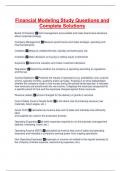Exam (elaborations)
Financial Modeling Study Questions and Complete Solutions
- Course
- Institution
Board of Directors Hold management accountable and make board-level decisions about corporate strategy Company Management Measure performance and make strategic, operating and financial decisions Creditors Measure creditworthiness, liquidity and bankruptcy risk Investors Make decisions on buying...
[Show more]



